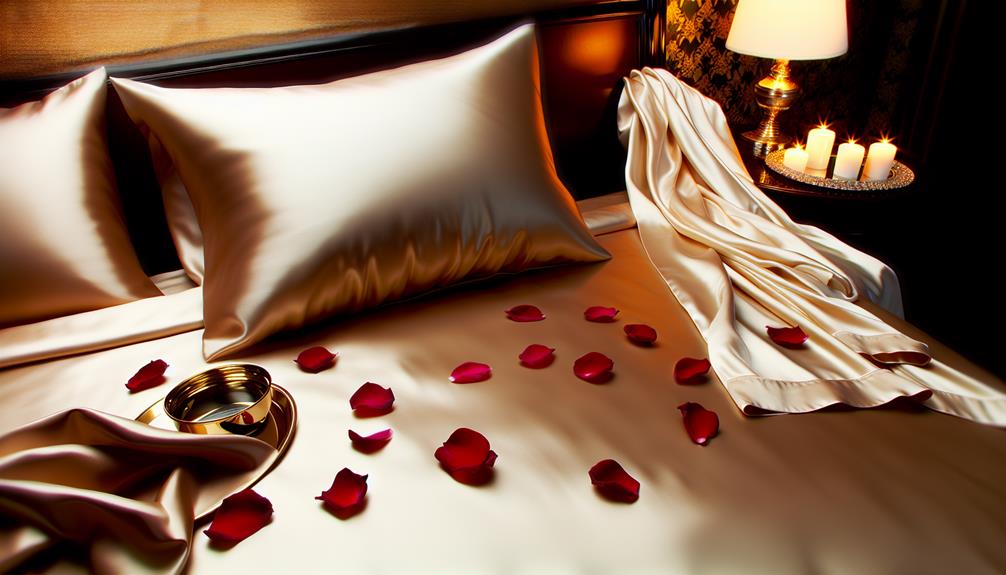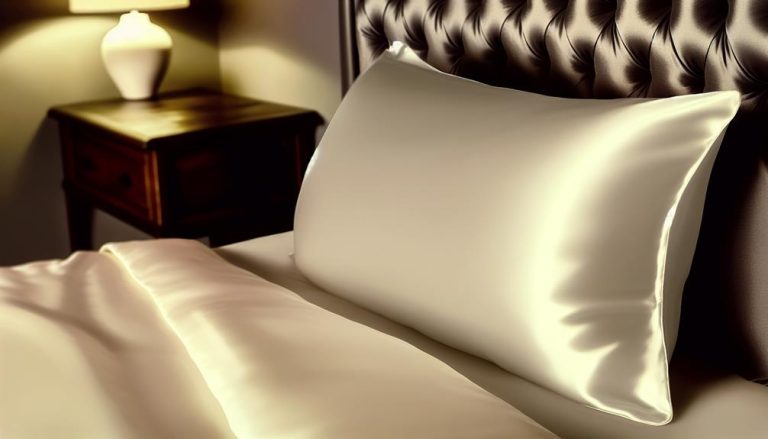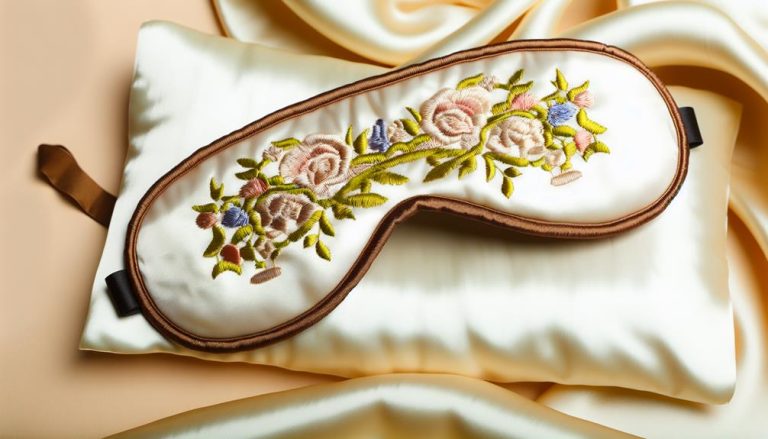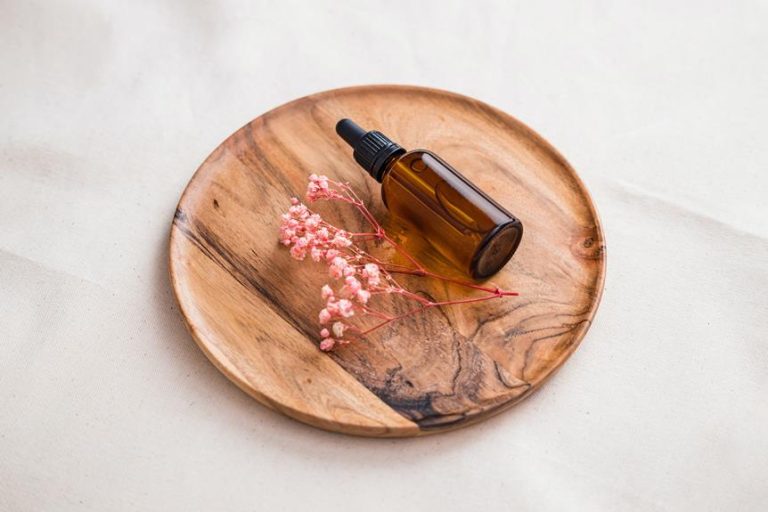Discover the soothing relief a silk pillowcase can bring to your nighttime routine. Have you ever experienced the annoyance of an itchy scalp keeping you up at night, like a persistent mosquito buzzing around your head? It’s maddening, isn’t it?
Well, fret not, because we’re here to uncover the reasons behind this nighttime itchiness and introduce a simple solution that could bring you the peaceful slumber you’ve been longing for – a silk pillowcase.
But before we get to that, let’s dive into the various culprits that could be causing your itchy scalp, from dryness and dandruff to allergies and even head lice.
So, grab a cup of tea, settle in, and prepare to bid farewell to those sleepless nights.
Causes of Itchy Scalp at Night
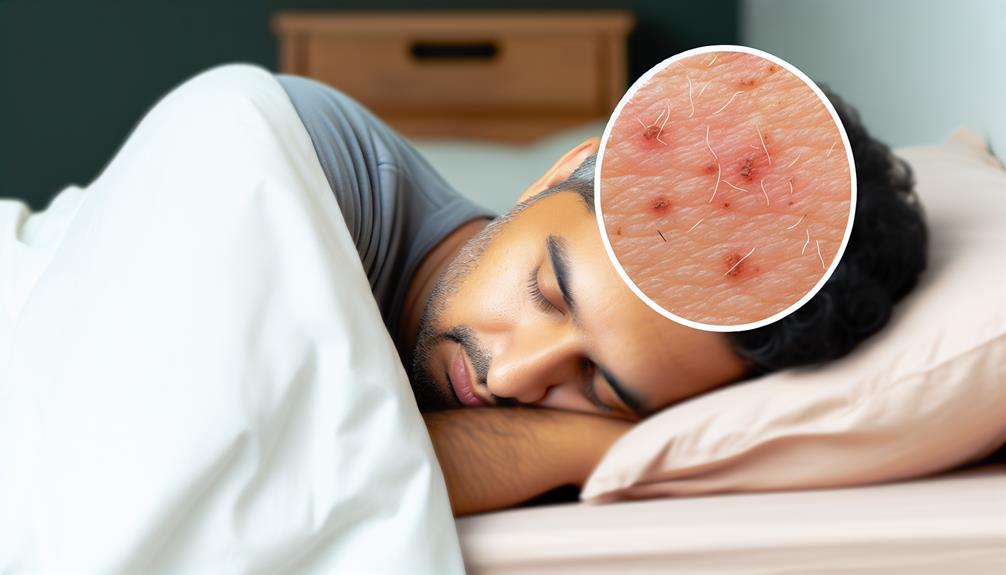
At night, there are several potential causes for an itchy scalp that can disrupt our sleep and leave us feeling uncomfortable.
One common cause is a dry scalp, which occurs when our scalp lacks enough moisture.
Another culprit is dandruff, also known as seborrheic dermatitis, which leads to flaky and itchy skin.
Allergies to hair products can also trigger an itchy scalp, as well as hives, head lice, and scabies.
To alleviate the itchiness, we can try using special shampoos for dandruff or natural remedies like tea tree oil, coconut oil, or peppermint oil.
Additionally, maintaining a cool temperature on our head at night and using a silk pillowcase can provide relief.
Remedies for Itchy Scalp
To address the issue of an itchy scalp, there are various effective remedies available that can provide relief and restore comfort to your scalp.
If you’re dealing with dandruff, using special shampoos designed to combat this condition can be helpful. Additionally, natural remedies like tea tree oil, coconut oil, or peppermint oil can be soothing and provide relief.
Another remedy to consider is using a silk pillowcase. Silk is gentle on the scalp and can help reduce friction, which may alleviate itchiness.
For hives, taking a colloidal oatmeal soak can provide relief. It’s also important to maintain a cool temperature on your head at night to prevent excessive sweating, which can worsen scalp itch.
Hair Care and Itchy Scalp
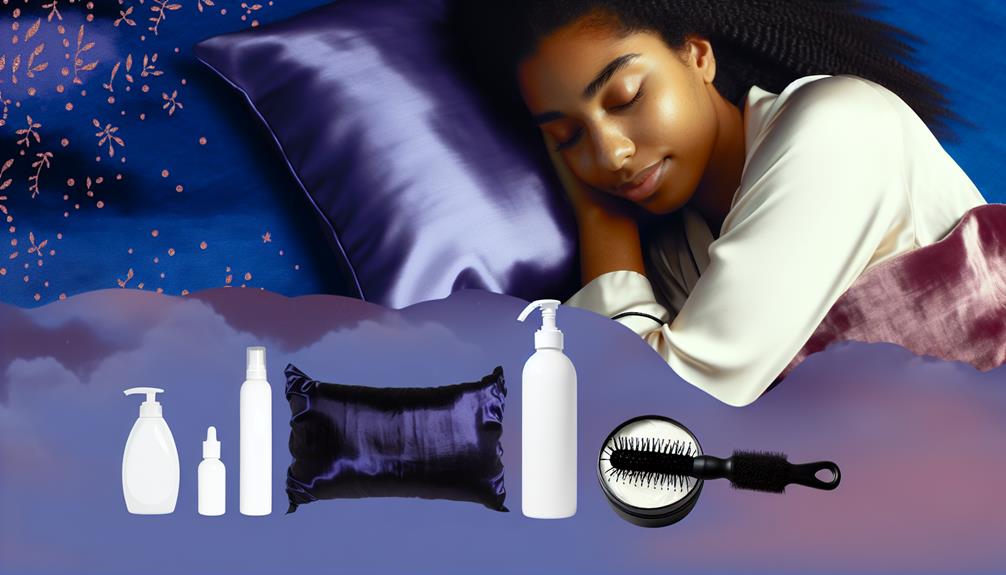
Using the right hair care practices is essential for maintaining a healthy and itch-free scalp. When it comes to preventing and relieving an itchy scalp, there are a few key things to keep in mind.
First, be cautious of leaving shampoo in your hair, as this can cause irritation and lead to itching. It’s also important to be aware of any allergies you may have to hair product ingredients, as these can contribute to scalp itchiness. Rinse well and repeat if necessary to alleviate any discomfort.
Additionally, using a silk pillowcase can be beneficial for your hair and scalp health. Silk is gentle on hair follicles and helps to maintain moisture, reducing the risk of itching and irritation.
Skin Conditions and Itchy Scalp
After discussing the importance of hair care practices in maintaining a healthy and itch-free scalp, let’s now explore the connection between skin conditions and the discomfort of an itchy scalp.
Skin conditions such as psoriasis and atopic dermatitis (eczema) can be culprits behind that incessant scalp itch. Psoriasis can cause flare-ups on the scalp, leading to itchiness and discomfort. Eczema, on the other hand, can result in a burning sensation and intense scalp itch.
To prevent flare-ups, it’s important to moisturize the scalp regularly. Allergic reactions and environmental allergies can worsen eczema, so it may be beneficial to use hypoallergenic pillowcases.
It’s crucial to seek medical attention if you experience consistent and disruptive scalp itch, as it could be a symptom of an underlying condition that requires accurate diagnosis and treatment.
Benefits of Silk Pillowcases
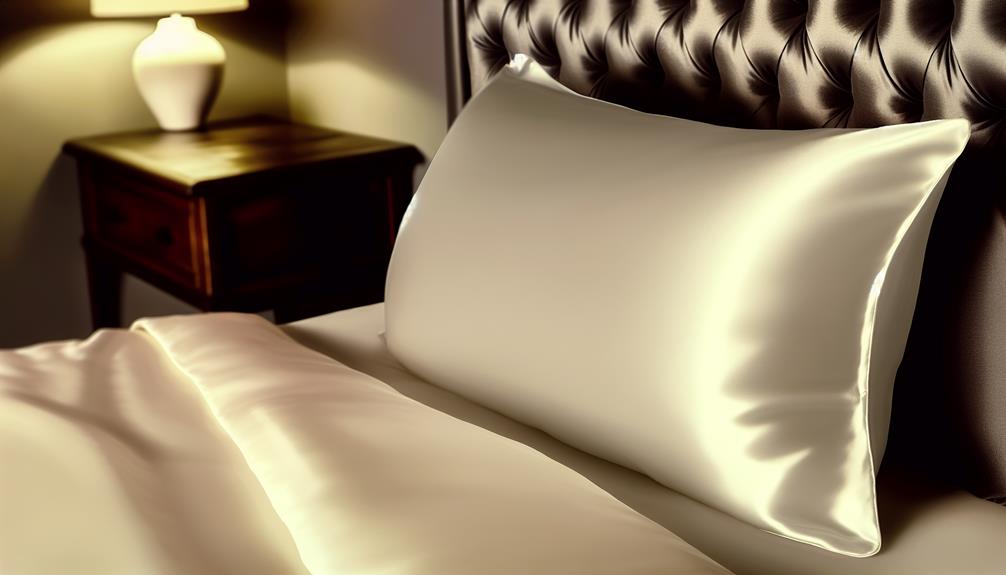
Silk pillowcases offer a multitude of benefits for those seeking relief from an itchy scalp at night. Not only are they incredibly soft and luxurious, but they also provide a gentle and soothing surface for your scalp.
Unlike rough cotton pillowcases that can irritate your skin and cause friction, silk pillowcases are smooth and frictionless, reducing the risk of further aggravating your itchy scalp.
The natural properties of silk help to retain moisture, preventing your scalp from drying out and becoming itchy. Additionally, silk is hypoallergenic, making it an ideal choice for those with sensitive skin or allergies.
It’s time to liberate yourself from the discomfort of an itchy scalp at night by investing in a silk pillowcase.
When to Seek Medical Attention for Itchy Scalp
If you are experiencing consistent and disruptive itchiness on your scalp, it is important to seek medical attention. While an itchy scalp can often be remedied with simple changes to your hair care routine or home remedies, there are times when professional help is necessary. Here are some situations that warrant a visit to the doctor:
| When to Seek Medical Attention for Itchy Scalp | Why Seek Medical Attention? |
|---|---|
| Scalp itch that persists for an extended period | Accurate diagnosis and treatment for underlying conditions like scalp ringworm |
| Scalp itch accompanied by pain or discomfort | Evaluation of nerve damage from scarring or skin cancer |
| Scalp itch that worsens over time | Proper diagnosis is crucial for effective treatment |
| Scalp itch that affects your daily life | Seek a doctor for severe or persistent issues |
Frequently Asked Questions
Can Stress or Anxiety Cause an Itchy Scalp at Night?
Yes, stress or anxiety can cause an itchy scalp at night. When we’re stressed or anxious, our bodies release stress hormones that can disrupt the balance of our skin and cause inflammation. This can lead to an itchy scalp.
It’s important to manage stress and anxiety through relaxation techniques, exercise, and self-care. Additionally, using a silk pillowcase can help soothe the scalp by reducing friction and irritation, promoting a calmer and more comfortable night’s sleep.
Are There Any Specific Foods or Dietary Factors That Can Contribute to an Itchy Scalp at Night?
There are no specific foods or dietary factors that can directly contribute to an itchy scalp at night. However, certain factors such as dehydration or nutrient deficiencies can affect the health of your scalp and potentially lead to itchiness.
It’s important to maintain a balanced diet and stay hydrated to promote overall scalp health.
Additionally, using a silk pillowcase can help alleviate itchiness by reducing friction and irritation on the scalp.
Can Hormonal Changes or Imbalances Lead to an Itchy Scalp at Night?
Hormonal changes or imbalances can indeed lead to an itchy scalp at night. When our hormones fluctuate, it can affect the production of oils in our scalp, leading to dryness and irritation. This can cause itchiness, especially when lying down at night.
It’s important to address the underlying hormonal issue to alleviate the scalp itch. Consulting with a healthcare professional can help determine the best course of action to balance hormones and relieve the itchiness.
Is It Possible for Certain Medications to Cause Nighttime Scalp Itchiness?
It is possible for certain medications to cause nighttime scalp itchiness. Some medications, such as antifungal drugs or acne medications, can have side effects that include dryness and irritation of the scalp.
This can lead to itching, especially at night when your scalp is in contact with your pillowcase.
If you’re experiencing persistent scalp itchiness after starting a new medication, it’s important to consult with your healthcare provider to discuss possible solutions or alternatives.
Can Wearing Tight Hats or Headgear While Sleeping Contribute to an Itchy Scalp at Night?
Wearing tight hats or headgear while sleeping can indeed contribute to an itchy scalp at night. The pressure and friction from these accessories can irritate the scalp, leading to discomfort and itchiness.
It’s important to allow the scalp to breathe and avoid constriction during sleep. Opting for loose-fitting and breathable headgear, or even going without it, can help alleviate the itchiness and promote a more comfortable night’s sleep.
Conclusion
In conclusion, experiencing an itchy scalp at night can be a frustrating and uncomfortable problem. However, there are various remedies available, such as specialized shampoos and natural oils, to help alleviate the symptoms.
Additionally, incorporating a silk pillowcase into your nighttime routine can provide soothing relief for your scalp. By taking care of your scalp and hair, and using hypoallergenic pillowcases, you can improve your sleep and say goodbye to the itchiness.
Don’t let an itchy scalp keep you awake any longer!

